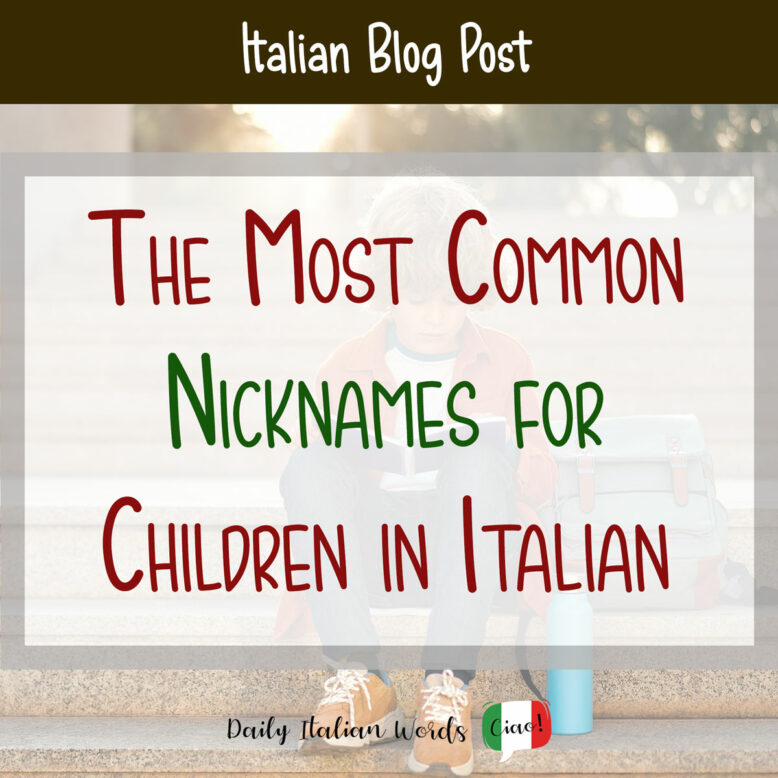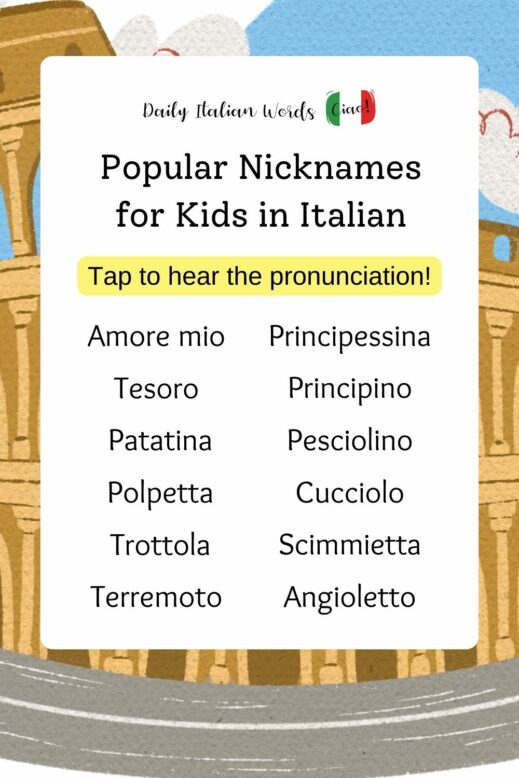Across the globe, it’s a widespread practice for parents to use affectionate terms when addressing their children. In fact, nicknames are frequently employed more often than the actual names within certain families! Italy is, of course, no different to any other country in the world, boasting numerous amusing and elaborate “nomignoli” or “soprannomi” for children.

Italian nicknames for children
The practice of bestowing nicknames in Italy has its roots in ancient times. Throughout history, these nicknames weren’t limited to just children; they were also exchanged among friends and family as a way to convey closeness, affection, and sometimes playful teasing. As time has passed, these names have undergone changes, with some gaining popularity while others have diminished. However, at their core, they continue to symbolise profound affection and the strong ties within families.
But this naturally leads to the question: what are the most common nicknames for children in Italy? Let’s uncover them together.
Patatina / Patatino
The word patatina actually means “little potato,” and it’s primarily used to describe baby girls who are slightly chubby, have remarkably soft cheeks, or possess a button-like nose. However, there isn’t always a specific reason for this choice. In fact, in many instances, it’s merely a nickname that resonates positively with one of the parents. You can also use the masculine patatino for boys.
Polpetta
This is another example of a food-related nickname frequently used for children in Italy. The primary significance is “meatball,” and it’s perceived as endearing. Often, there isn’t a specific rationale for selecting this nickname. However, it’s particularly popular when referring to newborns or infants due to their petite size, which evokes the idea of something tender and round.

Trottola
This is a highly amusing nickname for children that parents use when the child is constantly energetic and tirelessly active. The term translates to “spinning top,” aiming to capture the continuous and unceasing motion of this toy when it’s in action. You might hear parents saying, “The spinning top isn’t running out of energy today.“
Principessina / Principino
In the eyes of their parents, every child is seen as a “little princess” (principessina) or a “little prince” (principino). These two nicknames are quite prevalent, and they’re also used by relatives or friends of the parents when the children are dressed up for a special event. At times, the term is employed when the children are somewhat spoiled, and in certain cases, it can even convey an air of being pampered and cherished.

Pesciolino / Pesciolina
This nickname, little fish, is extensively used throughout the entire peninsula. In certain instances, the term can shift from being an affectionate term to an augmentative form by altering its suffix from -ino/a to -one/a. In this modified instance, pesciolone/a, which translates to “big fish,” represents its direct opposite. However, it’s uttered with a gentle tone, conveying warmth and affection.
Amore mio
Amore is probably one of the most frequently used nicknames in Italy. In English, it translates to “love,” and it’s closely associated with the deep emotions between a mother/father and their children. It’s almost always used with the possessive adjective “mio” (my), without which it becomes more connected to lovers who use the term amore to address each other.

Tesoro
This term directly translates to “treasure.” However, its true intention is to convey affection or love towards someone. In English, the more common equivalent would be “sweetheart.” When an Italian mother says, Sei il mio tesoro, it would be akin to saying “You’re my sweetheart.” Parents also use it to express the importance of their child to them, as in un vero tesoro (“a genuine treasure”). You may also hear the diminutives tesorino and tesoruccio.
Cucciolo / Cucciola
Cucciolo, which translates to “puppy” or “cub” in English, is a nickname that many parents turn to when describing the delicacy and smallness of their children, especially during their early years of life. This is among the most endearing nicknames used, and often, when addressed by it, children blush out of shyness. For girls, you can use the feminine equivalent cucciola, and can also expect to hear the diminutives cucciolino/a, cucciolotto/a and cuccioletto/a, along with the augmentative cucciolone/a.

Scimmietta
“Little monkey,” frequently applied to baby girls, is used for those who enjoy climbing onto chairs, sofas, and tables. At times, when their climbing habits become so extreme that it exasperates their parents, they might also be referred to as babbuini (baboons). In this scenario, it takes on a slightly negative connotation, but still maintains an underlying tender tone.
Terremoto
If someone calls you an “earthquake,” it means you’re putting your best effort into turning the house upside-down. In Italy, parents use this term for kids who are full of energy and tend to break something wherever they go. Most of the time, people use it in specific moments when something happens, especially when a kid breaks something important that one of the parents loved dearly.

Panzerotto
Are you familiar with the Italian dish panzerotto, also known as panzarotto? If not, you must try it someday! This savoury turnover, originating from southern Italy, resembles a small calzone. Due to its small and round shape, Italian parents often affectionately call their children panzerotto. How cute is that?
Vita mia
A child brings great joy and meaning to a parent’s life. To communicate this to your little one, you can use the lovely nickname vita mia, which literally means my life.

Angioletto
In contrast to the previous “earthquake,” there are children who are quiet and calm like little angels. In Italy, they say, hanno l’aureola, meaning that they have a halo. This word is used only in the masculine form since the feminine form doesn’t truly exist for it in Italian, although there are instances when it might be used.
Gioia
The nickname gioia, which literally translates to joy, reminds of the moment our beautiful baby came into the world and filled our lives with happiness. You can use it towards both boys and girls with a cheerful disposition. Another possible alternative is mia gioia (my joy).

Pulcino
Pulcino is an adorable nickname that literally means chick, as in the offspring of a hen. As you may have noticed, Italians love to compare their kids to animals, especially those that are small and fluffy!
Pulce
Pulcino shouldn’t be confused with the similar-sounding pulce, which is what Italians call a flea. They often use this nickname to describe a child with a bit of a naughty streak, but it’s used in a friendly and joking manner.

Amoruccio
The nickname amoruccio is the combination of amore (love), which we already saw above, and the suffix -uccio/a, which is often applied affectionately to names, such as Mariuccia (Maria + uccia). It’s similar to saying “little darling” in English! You may also hear the similar diminutive amorino (“little love”).
Bambolotto / Bambolotta
It’s so tempting to compare our beautiful children to dolls, especially when they are tiny, chubby babies! This is exactly where this nickname comes from – bambola + the suffix -otto/a meaning “little doll.”

Cocco / cocca di mamma
Cocco di mamma (of mommy) is an adorable, onomatopoeic nickname that more or less equates to “mamma’s boy” or “mamma’s favourite boy.” You can use the feminine equivalent cocca di mamma as well. Note that the word cocco used in this sense has nothing to do with coconuts (also cocco)!
Topolino / Topolina
It’s very common for Italians to compare the people they love to cute animals, and topolino is no exception. It literally translates to little mouse.

Birichino / Birichina
But what if your child has a naughty streak, or maybe he or she is always getting into some kind of mischief? If so, there is no better nickname than birichino for a little rascal, or birichina for a cheeky girl.
Monello / Monella
Sticking with the theme of naughtiness, another perfect nickname for a child who can’t help but get into trouble is monello (masculine) or monella (feminine). In fact, I call my son monello at least ten times a day! You can also expect to hear the diminutive equivalents monellino, monellina, monellaccio and monellaccia.

Birba
Another common nickname Italians use for a naughty child is birba, which has several variations, including birbante, birbantello/a, birbone/a, and birboncello/a. Despite being a feminine noun, it can be used for both boys and girls.
Mostro / Mostriciattolo
In English, we often call children little monsters, and Italian is no different. You can simply call a child mostro, or you can use the diminutive form mostriciattolo, which translates to little monster.

Meraviglia
The Italian word meraviglia means marvel, splendor, or magnificence. While it may sound unusual to our English ears, it’s quite a common term of endearment in Italian for both boys and girls.
Puzzettone / Puzzettona
If a child hasn’t had a bath in a couple of days or accidentally lets out a stinky, it’s quite common for Italian parents to affectionately call them puzzettone (for boys) or puzzettona (for girls). These playful nicknames literally mean “big stink“!
Chiacchierone
Were you a real chatterbox as a child? Then your parents probably called you a chiacchierone (masculine) or chiacchierona (feminine) at some point! Chiacchierare in Italian is a verb that means “to chat / chatter” and -one / -ona is a suffix that means “big”!

Sorrisone
Do you have a very smiley baby with a happy demenour? Then you can address them using the lovely nickname sorrisone, which means “big smile”! For a girl, this would become sorrisona.
Tenerezza
Tenerezza in Italian literally means affection or tenderness, but it can also function as a sweet nickname for your child. Note that tenerezza remains feminine even if you are addressing a boy.

Cuoricino / Cuoricina
This sweet nickname is the diminutive form of the word cuore, which means heart in Italian. In other words, it’s a lovely way of calling your little one your “little heart”!
Pupa
Let’s finish this article with a sweet nickname that’s often directed towards newborn baby girls – pupa – which means . It’s very similar to our word poppet in English. A very young baby boy may also be referred to as pupo with the masculine ending.

Conclusion
The Italian language features a vast range of nicknames that have endured over time. These affectionate terms, often passed through generations, go beyond playfulness; they reflect Italy’s strong family values and culture of warmth, while reminding us that language carries love, history, and connection at its heart.
Did your parents or grandparents call you by any of these nicknames? Let us know in the comment section below.


Fabio Guarino is a Linguist and Language Specialist who operates as a Freelance Content Writer and SEO Marketer. He considers himself fortunate to be able to blend his passion for his native language, Italian, along with English and Spanish, with his career.


